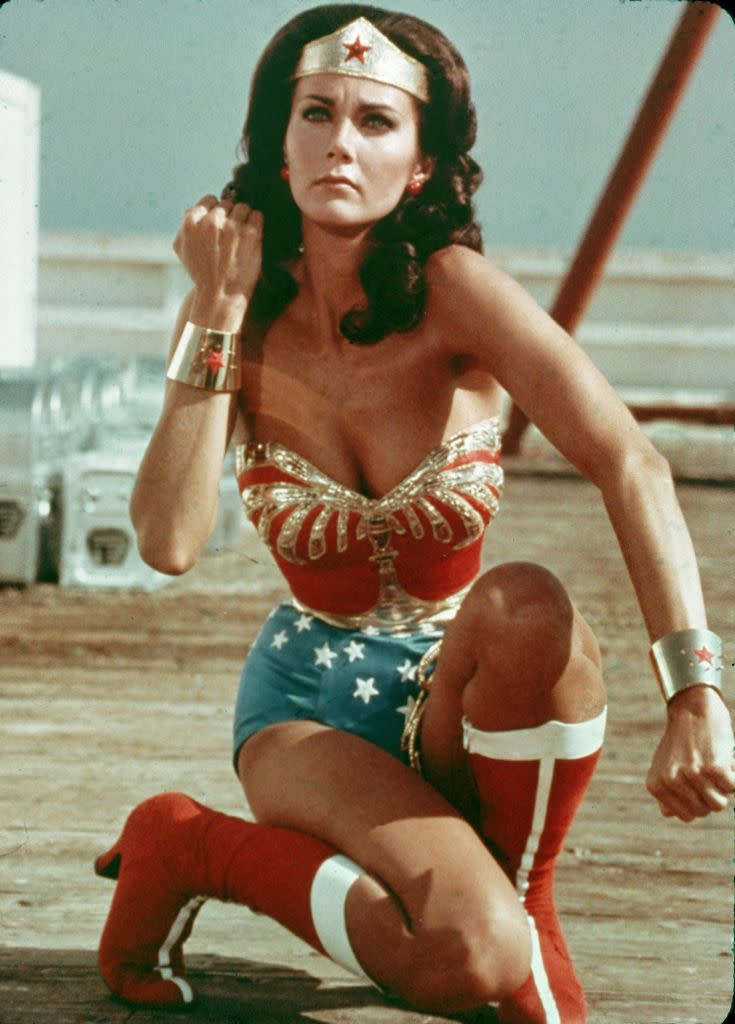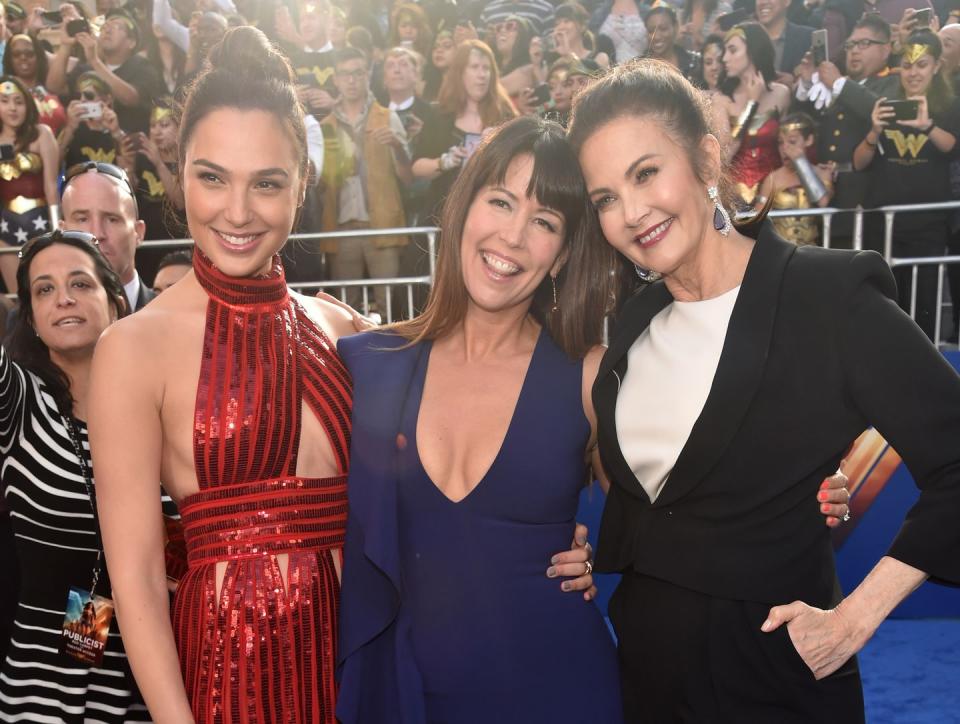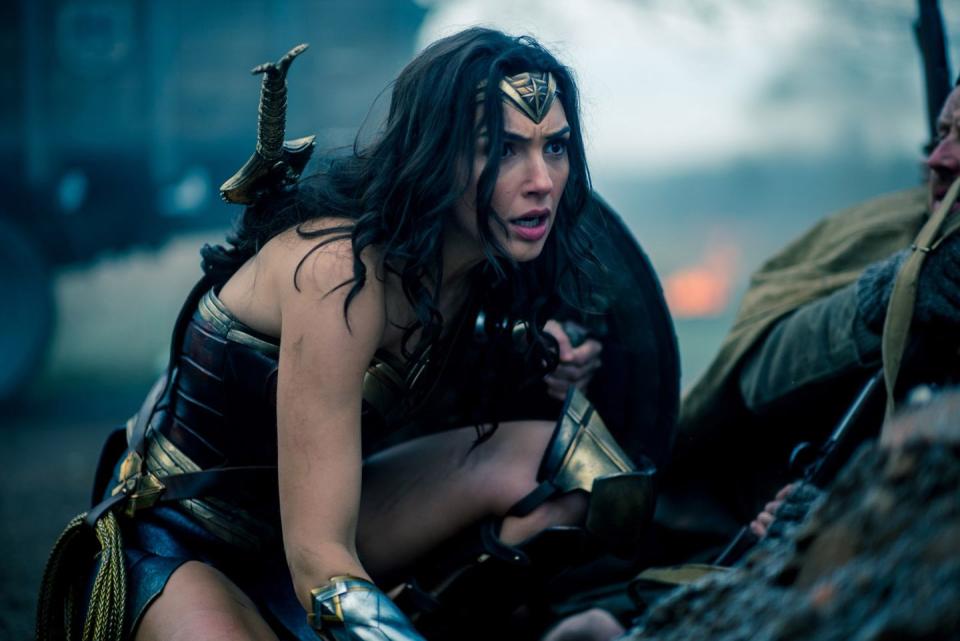Wonder Woman 1984 Director Patty Jenkins In Conversation with Lynda Carter

- Oops!Something went wrong.Please try again later.
- Oops!Something went wrong.Please try again later.
Santa Claus isn’t the only anticipated arrival on December 25. After all, Christmas Day is also when Wonder Woman is set to arrive, streaming on HBO Max in the new movie Wonder Woman 1984. It’s the second installment in a series by director Patty Jenkins, and this time Gal Gadot’s title character (intriguingly loaded alias: Diana Prince) is battling the forces of evil in the 1980s. That’s not the only change audiences have to expect.
In a much-ballyhooed move, the film is streaming on its opening day—a workaround to today’s theatrical release troubles and fitting nod to Wonder Woman’s small-screen origins. While the character first appeared in the 1940s as a member of DC Comics’ Justice League, she reached a much broader audience beginning in 1975 when Lynda Carter portrayed the character in the Wonder Woman TV series, which ran for three influential seasons.
For plenty of people, Carter—who has worked extensively on stage, screen, and in the recording studio since Wonder Woman, and will be releasing a new song, "Human and Divine," inspired by the character in early 2021—will always epitomize the superhero, but that doesn’t mean the legendary actress won’t embrace Jenkins’s blockbuster reboot. In fact, the two (who happen to share a birthday; they’re both Leos) have a warm, familiar friendship and share a deep understanding of the character and her impact on the performers who portray her and the fans alike.

Here, Carter and Jenkins discuss the impact of Wonder Woman on their own lives, the enduring importance of the character for audiences, and the importance of passing the baton—or, in this case, the golden lasso.
Lynda Carter: Let's go back a couple of years. When Patty first was assigned to direct this, I was thrilled knowing what she has done in the past with female characters. Impossible female characters. How do you give humanity to a serial killer [like in Monster]? And yet, she managed to do that. I didn't know how she did it in some of the films that she's done. Then, she took this character, who I love with all of my being, and she was true to every single part of it.
She developed this soul and this spirit inside the bones of her. Why people love her is not the superpower, it’s the intellect. It’s the idea of who we are from the inside out. And that's how Patty is able to direct it, because she is Wonder Woman.
I built my character in a sea of men back in the day. It was men writers, men directors, men producers, men actors, men studio executives, and all of their opinions. I was a pretty stubborn young girl and tried to do it my way. And now here we are with these fabulous women: Gal Gadot, who embodies that character so perfectly, and Patty, who is the brains of the character. We need this Wonder Woman '84 more than ever; I stand behind Gal, I stand behind Patty and the soul of the character, particularly right now. We need this inspiration.

Patty Jenkins: Thank you, Lynda. It's interesting because you didn't just get it, Lynda, you really created it on so many levels. You taught it. Here's what you and I both know that we love about the character: we love everything that Wonder Woman stood for, right? But, she was not totally fleshed out. She had these values that we loved. And this is why I find she's so important right now.
She has values to me, unlike almost any other superhero, even Superman, who's probably the most clean-spirited superhero. Wonder Women is the only superhero who has come here to teach mankind about love, and has superpowers that she can use in that process. No other superhero is like that. That's what I think is so incredible, and why I feel so honored to have this character to work with right now, because Wonder Woman stands for something so important, which is that we have to become better. We're all going to have to think about how do we love each other more and save this world together?
LC: That's what I love about your message, and particularly during this time. It's about love and justice. It's so easy to hate what has gone on and forget empathy, but we must endure.
PJ: I wasn’t allowed to watch much television as a kid, so I just remember when Lynda's show came on at other kids' houses. Your Wonder Woman was so amazing, so cool looking and so warm. I just remember seeing it and we were like moths to the flame as kids.

I think I was in elementary school, and all the boys would play superheroes and be fighting each other, and the second Wonder Woman came out, we were like, “Oh, I'm Wonder Woman.” There was no female character for us to engage with before. And that was an interesting thing, all of a sudden you would run out there as fast as possible to be the first girl there to claim Wonder Woman. It's one of the reasons I've also defended the beauty of Gal being Wonder Woman and said, “No, she shouldn't be tougher.” She shouldn't have to be dressed down and less beautiful to be powerful.
Lynda being so beautiful was an intrinsic part of it. She was the idealized woman in every way. This other struggle that we've had all these years was needing to make females more masculine to make them stronger. Well, that's no victory at all, because now you're saying only being like a man is strong. I don't believe that. And I think I intrinsically don't believe it because I experienced it through Lynda as a kid, that feeling like I looked beautiful and was super strong at the same time. And it doesn't mean everybody has to be as beautiful as Lynda. It's about the feeling of being feminine and owning that. And then being just and powerful at the same time, that was super important to me.
LC: I recall really having some very pointed discussions with the producers about not dumbing her down. I won the argument eventually… it was about the complex nature of women, the complex nature of who we are. I still am what I was; I know how to be a kid and I know how to be the age I am now. I have that experience in me. I don't look the same, and I don't want to go back. It's your turn, and it's Gal's turn. Who I am now is your cheerleader.
PJ: You're a lot more than that, but I certainly think that that's such an incredible part of our threesome dynamic is an interesting dedication to the character and then to doing good in the world, however we may do it, in whatever role we're playing.

LC: You and Gal and I adore each other because we own a piece of the soul of this wonderful character.
PJ: What amazes me about the spirit of that character is that it's never been about any of us. Part of the thing that unites all of us is saying, “Oh, my God, this character brings so much beauty into the world.” It's been so funny directing Gal, so often she's not an actress and I'm not the director. We're both looking upwards, thinking, “Did we do our parts for those kids who will see this?” It's an interesting thing to live up to a legacy so much bigger than oneself.
LC: I will tell you something a little more self-deprecating. After the first episode of Wonder Woman, when the big pilot aired, I proceeded to march myself out to a big Mexican restaurant in the Valley. And I just walked in expecting everyone to recognize me—and no one did. I said, "Did you watch TV last night?" "No." "Don't you recognize me?" "No." I was so disappointed.
PJ: When did they start to catch on? When did you start to get noticed all the time?

LC: It was when I really started getting on covers of magazines and started doing things for Maybelline.
PJ: I can't even imagine what it was like for you. I'm sure it was not an easy road.
LC: Well, it was so long ago. I've been famous for such a long time now, that I think now I’m at the point where you just hope you're not forgotten.
PJ: You're not going to be forgotten!
LC: Somebody said that to me: “I didn’t know she was still alive.” It's just hysterical. And, of course, I am still kicking. I'm out there fighting for votes, fighting for the rights of men and women, the rights of gay people. I'm always on my high horse.
PJ: I know, and I love it. Doing good in the world. What I love about this character and think is so important, is finding the hero in yourself. We need to start telling stories to everybody again that say, “Find the hero within yourself, even if it's hard, even if it's scary, even if you're not sure what to do.” We are facing real devastation on this planet in such a big way on so many levels that if everybody doesn't stop where they are and find the the brave person inside of themselves who can help us change the world, we don't stand a chance. One thing I love is hoping that every single person experiences the story of Wonder Woman and can find part of it in themselves.
LC: My daughter said she really understood what Wonder Woman was when she saw Gal play her. My own daughter! That said to me something about what I know you to be and what I know Gal to be, about how we can rise to the occasions of our lives. That is who we are. It's in our DNA, and that is Wonder Woman. It’s pure joy to see the inspiration when I talk to women who get it. I love to hear them. I am humbled by it.
You Might Also Like

